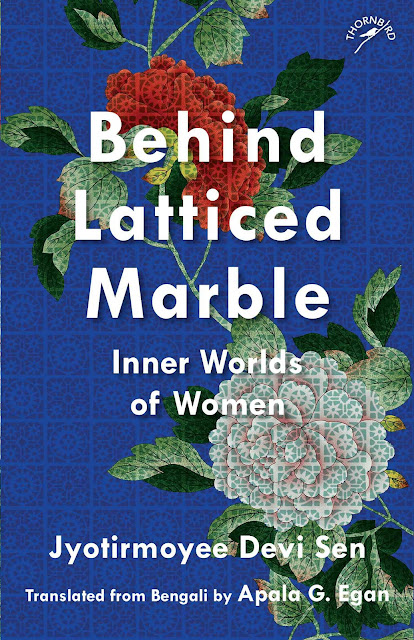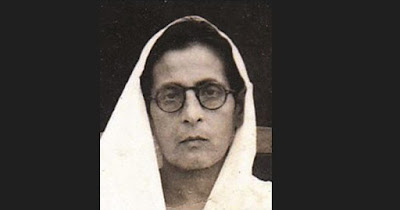Title:
Behind Latticed Marble: Inner Worlds of Women
Author:
Jyotirmoyee Devi Sen
Publisher:
Niyogi Books (2023)
Genre:
Literature, Translated Fiction
Pages:
216, Paperback
ISBN-13:
978-9391125332
Jyotirmoyee
Devi Sen’s Behind Latticed Marble is a collection
of 10 intriguing tales, originally written in Bengali, and translated into English
by Apala G. Egan. It offers a glimpse into the life of women behind closed
doors – the life of royal harems - in early 20th-century Rajasthan. Set against
the backdrop of Rajput grandeur, these narratives resonate with contemporary
issues as well.
Through
the timeless stories, Sen presents a nuanced perspective on struggles, social expectations,
and the nature of human interaction, especially between men and women within
this particular setting.
Each
story sheds light on the gender and caste norms that restricted their experience.
In the first story, ‘Beneath the Aravalli Hills’, a young girl from a village mysteriously
vanishes into the city and finds herself in the harem, and at last dies in
prison. This is an unsettling tale where the father sells his own daughter.
‘Sell
my daughter? Did I not raise her all these years? It costs money to feed and
clothe children? Why should His Highness get her for free?’
In
the story, ‘The Child Bride’ we witness the tragic journey of a young widow and
an unjust act of her in-laws. ‘Kesar was widowed, shortly afterward, her
husband’s brothers and his second wife sent the young woman on a long visit to
her stepmother’s home. She would recover from grief better there, they indicated.
They also said, ‘Leave your jewellery in our family vault. It will be safe here…’
As a result, Kesar endures a life of utter poverty, she serves along with other
impoverished widows at Vrindavan.
‘The
Princess Baby’ delves into the theme of dowry, whereas, ‘The Queen and the Concubine’
explores the challenges faced by women living in the harem, as well as those
living in the palaces. These stories reflect on the present society and prompt
readers to ponder upon the battles yet to be fought.
Born
into a prosperous upper caste family in Jaipur, Jyotirmoyee Devi married at
young age and widowed by 25, she returned to her mayaka and embarked on a prolific
writing career. Despite not pursuing a formal education, she found solace in
her grandfather’s library.
‘Behind
Latticed Marble’ contains 10 translated stories, each of which had previously
been published in international journals and gained recognition. Apala G. Egan brilliantly
captures the essence of Sen’s work. Seamless prose allows readers to fully
immerse in the vibrant world of Rajasthan.
With
its timeless themes, this collection provides a unique insight. An important read.
About
the Author
JYOTIRMOYEE
DEVI SEN was born in 1894, in the kingdom of Jaipur, during the time of the
British Raj in India. Her grandfather, who had emigrated there from Bengal,
rose to the position of dewan, or prime minister, to the Maharaja of Jaipur.
The lives of the queens and concubines in the royal harems made a deep
impression on her. She married Kiran Chandra Sen of Guptipara, Bengal, who
passed away during the influenza pandemic of 1918. Returning with her children
to her parents' home, she wrote under the pen name Jyotirmoyee Devi during her
long widowhood. Jyotirmoyee Devi Sen is among the earlier women writers of
modern Bengal, when most women were not allowed educational opportunities. She
won the prestigious Rabindra Puraskar for Bengali writing and her work is part
of the Women's Studies curriculum at Jadavpur University, Kolkata.
About
Translator
APALA
G. EGAN grew up in India and currently lives in the US. She is fluent in
Bengali and English and also speaks Hindi. A former community college
instructor in the United States, she devotes her time to translating and
writing. She has attended the Community of Writers Conference, formerly named
'Community of Writers at Squaw Valley', where she was awarded the Jeanne
Wakatsuki Houston Scholarship.
This post is powered by Blogchatter Review Program.

